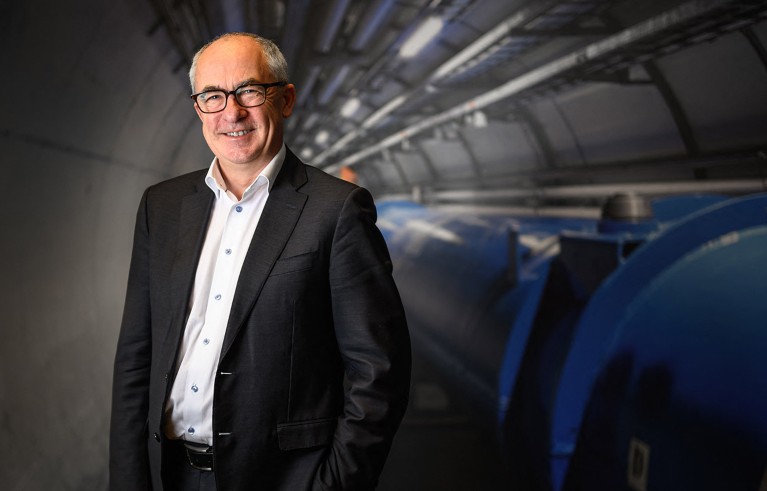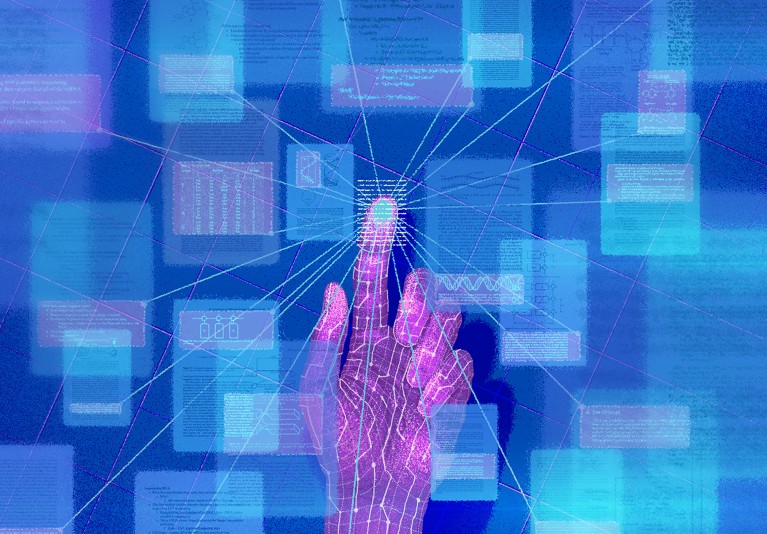Hello Nature readers, would you like to get this Briefing in your inbox free every day? Sign up here.

Mark Thomson will take the helm at CERN at the end of Fabiola Gianotti’s term. Credit: Fabrice Coffrini/AFP via Getty
Particle physicist Mark Thomson, the next director-general of Europe’s particle-physics laboratory CERN, will face major challenges as he steps into the shoes of predecessor Fabiola Gianotti. The lab has cut government-level ties with Russia and struggles with a faltering consensus surrounding the proposed Future Circular Collider (FCC). Thomson has reiterated Gionotti’s commitment to building the FCC, but the German government, CERN’s largest financial backer, is sceptical that the US$17 billion it could cost in its first phase is affordable.
Two Asian elephants (Elephas maximus) have been recorded engaged in behaviours never before observed in the large mammals. One, named Mary, has learned to use a hose as a showerhead, bypassing the need to spray water over her body from her trunk. This sophisticated use of a tool implies a complex understanding of water trajectory. Younger elephant Anchali deliberately attempts to thwart Mary’s efforts by creating a kink in the hose to stem the flow. Researchers suspect that Anchali might be jealous, or attempting revenge for Mary’s occasional aggression towards her.
Reference: Current Biology paper
A UK military communications satellite launched in 1969 is not where it’s supposed to be, and no one knows who moved it. Skynet-1A is now inoperative and “wandering backwards and forwards like a marble at the bottom of a bowl” in a gravity well above the Americas, putting other space traffic at risk. Control of the satellite bounced between the United Kingdom and the United States over the years, and the decision to move it from its home above Africa’s east coast to this risky location has been lost to the sands of time.
Features & opinion

Illustration: Piotr Kowlaczyk
Artificial intelligence (AI)-powered search engines are taking some of the tedium out of literature reviews by finding, sorting and summarizing relevant publications. But researchers are still a fair way from fully automating d the ‘gold standard’ systematic review, which involves a strict protocol to search and assess papers, and combine the results. And there are risks: some researchers fear that AI tools could lead to more sloppy, inaccurate or misleading reviews polluting the literature.
“Imagine that, every time you enter your office, it has been redesigned. So has how you are evaluated, and how you can speak with your superiors, but without your knowledge or consent.” This is the situation that some gig-economy workers found themselves in when job-listing platforms started to run experiments behind-the-scenes, writes entrepreneurship researcher Tim Weiss. And they are not the only ones. Researchers, who are increasingly becoming involved in such trials, should also beware: tech companies aren’t beholden to the rules that govern the ethics of experiments involving people, leading to questionable practices and potentially unreliable results.
Reference: Academy of Management Journal paper
Samantha Harvey’s novel Orbital — set inside a vessel inspired by the International Space Station — has won the coveted Booker Prize. “Orbital is such a small book, but it seemed as though all of life was in it,” says Booker judge Sara Collins. The experience of reading it “pulled us as far away as possible from our planet, with the strange and utterly compelling effect of neutralising earthly concerns while at the same time throwing them into the starkest relief”.
Before her win, Harvey spoke to the Nature Podcast on why her book treats low-Earth orbit as a domestic space. (Nature Podcast | 26 min listen)
Today I’m feeling inspired by the scientists recognized by this year’s John Maddox Prize, which honours those who stand up for science and is named for a former editor-in-chief of Nature. Winner Patrick Ball of the Human Rights Data Analysis Group has spent his career doing rigorous statistical and mathematical modelling to help defend human rights and identify war crimes. It’s well worth reading about all the shortlisted scientists if you need a pick-me-up boost of hope and inspiration.
Help us fight the good fight by letting us know how we can improve this newsletter. Your e-mails are always welcome at briefing@nature.com.
Thanks for reading,
Flora Graham, senior editor, Nature Briefing
With contributions by Jacob Smith
Want more? Sign up to our other free Nature Briefing newsletters:
• Nature Briefing: Careers — insights, advice and award-winning journalism to help you optimize your working life
• Nature Briefing: Microbiology — the most abundant living entities on our planet — microorganisms — and the role they play in health, the environment and food systems
• Nature Briefing: Anthropocene — climate change, biodiversity, sustainability and geoengineering
• Nature Briefing: AI & Robotics — 100% written by humans, of course
• Nature Briefing: Cancer — a weekly newsletter written with cancer researchers in mind
• Nature Briefing: Translational Research — covers biotechnology, drug discovery and pharma
